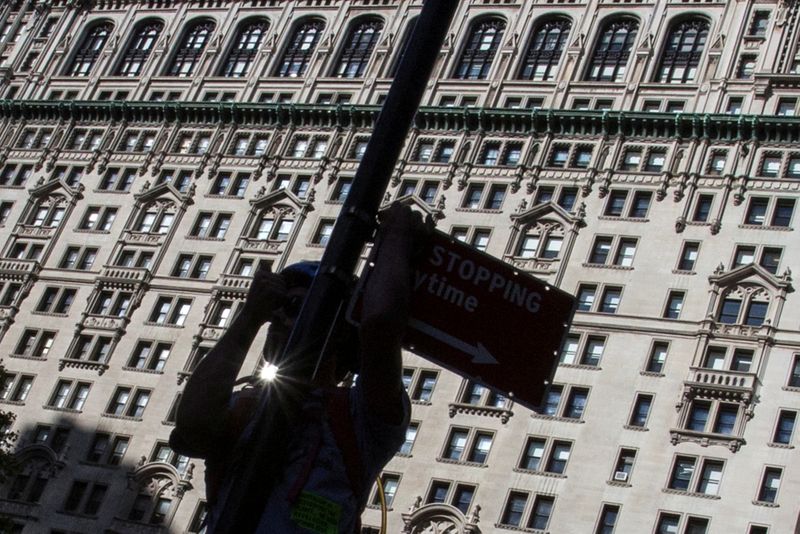By Pete Schroeder
WASHINGTON (Reuters) - While the U.S. Federal Reserve's next top regulatory official is still in the balance, one thing is certain: whoever gets the job will have a jam-packed agenda tackling the gamut, from capital rules and fair lending to digital assets and climate change.
Appointed to the Fed board by former Republican President Donald Trump, Randal Quarles will end his term as vice chair for supervision - a powerful role overseeing the country's largest lenders - in October. President Joe Biden has yet to say who would replace him.
Analysts and Washington insiders say the top contender for the role is Lael Brainard, a Fed governor who was a senior Treasury official under President Barack Obama. Other names floated include: Sarah Bloom Raskin, a former Fed governor; Atlanta Fed President Raphael Bostic; Acting Comptroller of the Currency Michael Hsu; and U.S. Treasury under-secretary Nellie Liang.
Each would have their own take on the role and, in turn, would have to win the backing of the Fed chair and board, both of which are also in the balance, to push through major changes.
But any Democratic pick for the supervision post, whether centrist or progressive, will be expected to chart a new course and tackle a number of looming and in some cases thorny issues, say analysts. These include:
CLIMATE CHANGE RISKS
Climate change, a top policy priority for Democrats, is expected to rapidly rise on the Fed agenda under new leadership.
"Climate is a key priority here," said Gregg Gelzinis, a senior policy analyst with think tank the Center for American Progress. "There are some initial steps the Fed can take swiftly."
So far, the Fed has asked lenders to explain how they are mitigating climate change-related risks to their balance sheets, and Powell has said he is open to some form of climate-focused stress tests.
Those projects are expected to accelerate. The big question will be whether Quarles' successor pushes for restrictions or stiffer capital requirements on banks with significant exposures to polluting industries or other climate-specific risks.
The Fed may also sign off on climate risk lending guidance for big lenders which Acting Comptroller Hsu said this month banking regulators are working on.
FINTECH FRAMEWORK
Quarles' successor will also have to tackle a regulatory blueprint for "fintech" companies which are quickly chipping away at the traditional financial sector.
The Fed is exploring how banks intersect with fintechs, particularly with smaller lenders that may outsource more services and infrastructure. Fintechs are also lobbying the Fed for access to its payments system.
While other banking regulators have worked for years to bring fintechs under their regulatory umbrella, the Fed has resisted, fearing doing so could create systemic risks. But as the sector continues to balloon, the Fed is expected to act.
“You hear a lot about the promise of fintech, but they should also be looking very closely at the risks," said Tim Clark, a former Fed official who now works with the advocacy group Better Markets.
On a related front, the Fed is currently studying the implications of a central bank digital currency. With studies from the Fed Board and Federal Reserve Bank of Boston expected out in the coming weeks, the central bank is trying to weigh the risks and advantages of such a product, which could expand the Fed's reach and help speed money transfers.
STRESS TESTS
Democrats criticized Quarles for revising rules introduced following the 2007-2009 financial crisis, and his successor is also expected to review his work. Banks' annual "stress test" health checks are likely to be top of the list.
Quarles tried to make the tests more transparent and predictable for banks, including scrapping a "qualitative" objection that allowed the Fed to flunk lenders on subjective grounds. Democrats say under Quarles the tests became too easy.
Jaret Seiberg, an analyst with Cowen Washington Research Group, wrote this month that stress test changes would likely come in 2023, and could include directing banks to reserve eight quarters of expected dividends, instead of the current four, and potentially reviving the qualitative objection.
SUPPLEMENTARY LEVERAGE RATIO
Another issue on the table is the supplementary leverage ratio, a rule created after the decade-ago crisis requiring banks to hold capital against assets regardless of their risk.
The Fed had to temporarily ease that rule in the midst of the pandemic as a glut of bank deposits and Treasury bonds drove up capital requirements on what are viewed as safe assets.
Despite intense bank lobbying, the Fed let that relief expire in March but promised to review the overall rule. The Fed has yet to publish a proposal, leaving the job up to Quarles' successor.
COMMUNITY REINVESTMENT ACT
The central bank will also play a key role in a long-awaited overhaul of the Community Reinvestment Act rules which promote lending in lower-income communities. The Fed, which shares responsibility for writing the rules with other bank regulators, hopes the rules can be updated to reflect the growth in online banking, while still ensuring lenders make meaningful contributions to the poorer areas they serve.
Efforts to update the rules under the Trump administration faltered after regulators could not agree on a path forward.

BASEL III
Lastly, the Fed still has to finalize capital rules dictated by the international Basel III accord. Many bank executives expect the new board to address that swiftly. While the Fed under Quarles has said the main goal is to keep overall capital requirements flat, a Democratic replacement may try to ratchet up capital cushions.